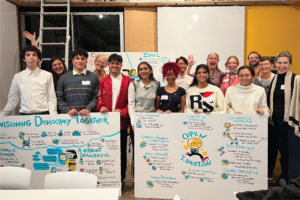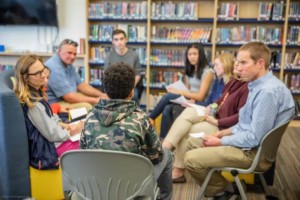iCivics Creates a Powerful Blend of Civics Knowledge and Engagement

 An unintended consequence of the intense focus on English and math standards and assessments in the NCLB decade is that civics took a back seat.
An unintended consequence of the intense focus on English and math standards and assessments in the NCLB decade is that civics took a back seat.
“We believe it is a great mistake to push civics to the sideline in schools,” says former Justice Sandra Day O’Connor. “Unfortunately, a staggering number of Americans today know dismayingly little about the basic history and traditions of our democracy. Nationwide, more than a third of all high school seniors today lack even basic civics knowledge and skills.”
Last week the Department of Education weighed in with two new reports, “Civic Learning and Engagement in Democracy: A Road Map and Call to Action” and “A Crucible Moment: College Learning and Democracy’s Future.”
In 2010, reports showed that less than 30 percent of fourth, eighth, and twelfth graders were proficient in U.S. civics. Declining civics knowledge is coupled with low voter participation. This has sparked recent initiatives at the Department to increase civic knowledge and engagement. Yet five years ago, Justice O’Connor saw this as an opportunity for the next generation of students.
In August 2007, Justice O’Connor and supporters like Warren Buffet convened the Teacher’s Conference to begin searching for solutions to the decline in civics education. They sought to engage and inspire the students of today in civics curriculum to become the leaders of tomorrow.
“Inside and outside the classroom, civics education needs to become more engaging and interactive. Twenty-first century civics education must not only be more hands-on, it also must meet students where they are—and where they are is online,” says Justice O’Connor.
In February 2009, Justice O’Connor launched OurCourts.org, which became iCivics.org, a web-based education project designed to inspire civics knowledge and engagement among K-12 students, to deliver the materials, support, and interest in civics, a year later.
“Every young person in America has access to an exciting and invigorating civics education,” says iCivics Executive Director Gene Koo.
iCivics is best known for its suite of 17 video games, which expose students to the federal budget, international relations, community planning, constitutional law, citizenship, and voting.
“Our games have been played close to four million times in the last two years,” says Koo. “Students are playing these games in non-school hours.”
In 2011, more than one million students and educators visited the website, downloaded the lesson plans and more. iCivics also has 71 extensive lesson plans, developed at a seventh grade reading level, adaptable for grades four to twelve.
“We get the most leverage when teachers are using our material,” says Koo. “They’re not just engaging and exciting for young people, but they are user-friendly and easy for teachers to deploy.”
All of the iCivics materials are in line with the state standards. Every state has some civics requirements, yet few have programs in place devoted to teaching civics. While teachers are highly focused on Language Arts, reading, and STEM curriculum, the iCivics lessons actually lighten the workload for educators, says Koo.
“We work really hard to ensure that the games fit into a half hour or less,” says Koo, “so that there’s time to frame or a prepare the lesson.” The games and activities can are developed in away that they are effective in a computer lab or with just one classroom computer.
iCivics is committed to keeping its games and lesson plans free for educators and students, delivering premium services and support. The organization hopes to increase students’ knowledge and involvement in local civics activities.
“At its best, the web is much more than just a source of information—it can be a powerful platform for students to exchange and debate ideas about what’s going on in their communities,” says Justice O’Connor. “The secret to America’s success is the strength of our civil society. An informed citizenry lays the foundation for not just democracy but also for an innovative, dynamic economy.”
This blog first appeared on Huffington Post






0 Comments
Leave a Comment
Your email address will not be published. All fields are required.